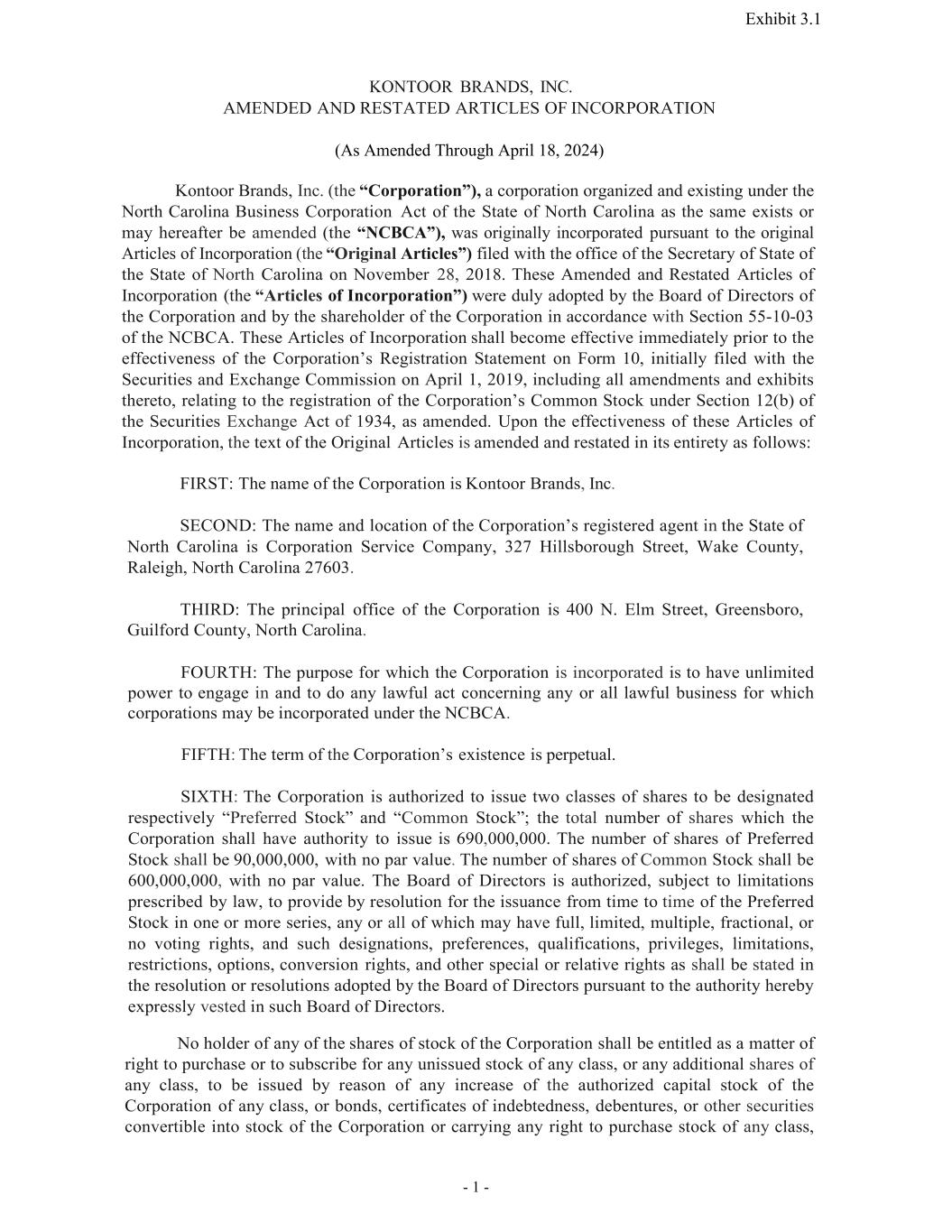
- 1 - KONTOOR BRANDS, INC. AMENDED AND RESTATED ARTICLES OF INCORPORATION (As Amended Through April 18, 2024) Kontoor Brands, Inc. (the “Corporation”), a corporation organized and existing under the North Carolina Business Corporation Act of the State of North Carolina as the same exists or may hereafter be amended (the “NCBCA”), was originally incorporated pursuant to the original Articles of Incorporation (the “Original Articles”) filed with the office of the Secretary of State of the State of North Carolina on November 28, 2018. These Amended and Restated Articles of Incorporation (the “Articles of Incorporation”) were duly adopted by the Board of Directors of the Corporation and by the shareholder of the Corporation in accordance with Section 55-10-03 of the NCBCA. These Articles of Incorporation shall become effective immediately prior to the effectiveness of the Corporation’s Registration Statement on Form 10, initially filed with the Securities and Exchange Commission on April 1, 2019, including all amendments and exhibits thereto, relating to the registration of the Corporation’s Common Stock under Section 12(b) of the Securities Exchange Act of 1934, as amended. Upon the effectiveness of these Articles of Incorporation, the text of the Original Articles is amended and restated in its entirety as follows: FIRST: The name of the Corporation is Kontoor Brands, Inc. SECOND: The name and location of the Corporation’s registered agent in the State of North Carolina is Corporation Service Company, 327 Hillsborough Street, Wake County, Raleigh, North Carolina 27603. THIRD: The principal office of the Corporation is 400 N. Elm Street, Greensboro, Guilford County, North Carolina. FOURTH: The purpose for which the Corporation is incorporated is to have unlimited power to engage in and to do any lawful act concerning any or all lawful business for which corporations may be incorporated under the NCBCA. FIFTH: The term of the Corporation’s existence is perpetual. SIXTH: The Corporation is authorized to issue two classes of shares to be designated respectively “Preferred Stock” and “Common Stock”; the total number of shares which the Corporation shall have authority to issue is 690,000,000. The number of shares of Preferred Stock shall be 90,000,000, with no par value. The number of shares of Common Stock shall be 600,000,000, with no par value. The Board of Directors is authorized, subject to limitations prescribed by law, to provide by resolution for the issuance from time to time of the Preferred Stock in one or more series, any or all of which may have full, limited, multiple, fractional, or no voting rights, and such designations, preferences, qualifications, privileges, limitations, restrictions, options, conversion rights, and other special or relative rights as shall be stated in the resolution or resolutions adopted by the Board of Directors pursuant to the authority hereby expressly vested in such Board of Directors. No holder of any of the shares of stock of the Corporation shall be entitled as a matter of right to purchase or to subscribe for any unissued stock of any class, or any additional shares of any class, to be issued by reason of any increase of the authorized capital stock of the Corporation of any class, or bonds, certificates of indebtedness, debentures, or other securities convertible into stock of the Corporation or carrying any right to purchase stock of any class, Exhibit 3.1
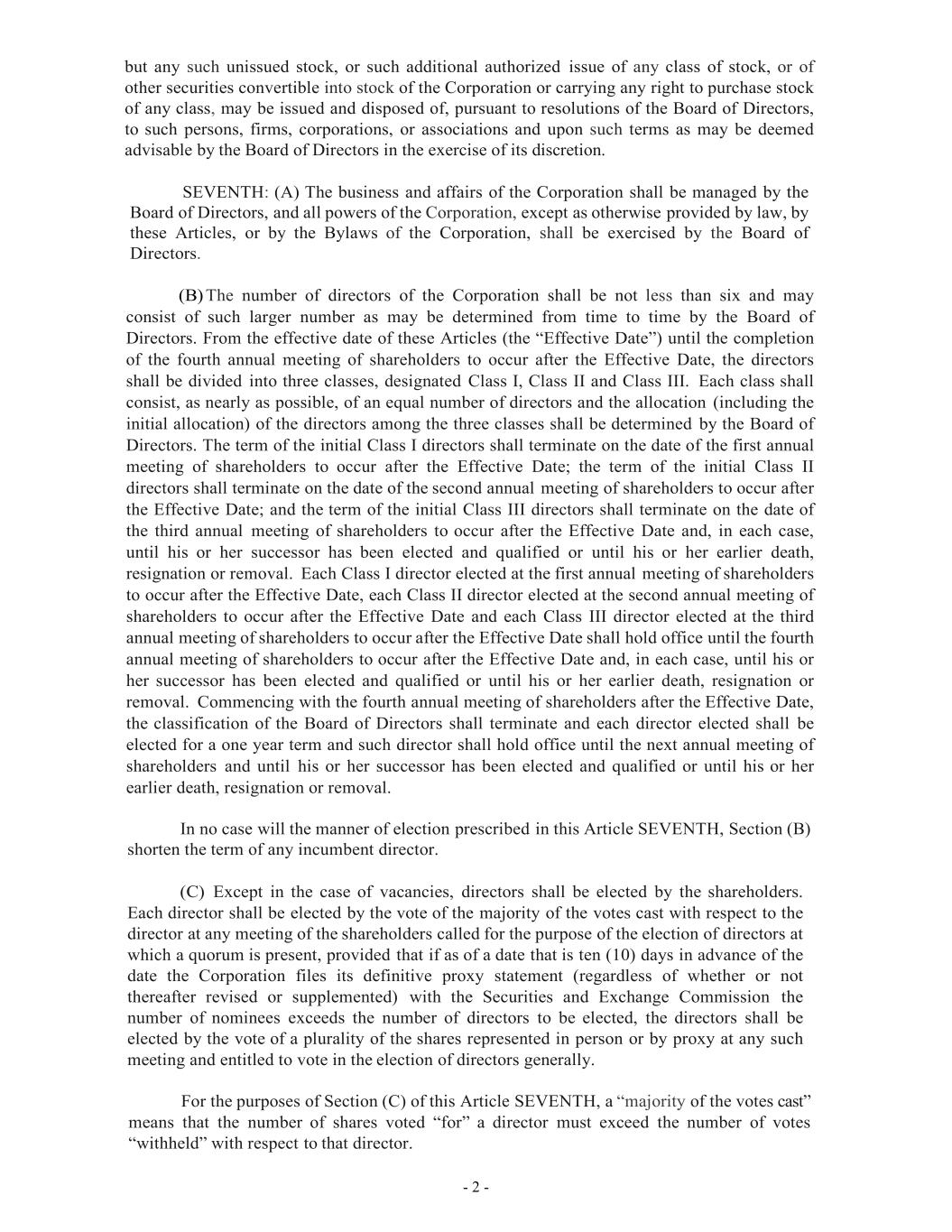
- 2 - but any such unissued stock, or such additional authorized issue of any class of stock, or of other securities convertible into stock of the Corporation or carrying any right to purchase stock of any class, may be issued and disposed of, pursuant to resolutions of the Board of Directors, to such persons, firms, corporations, or associations and upon such terms as may be deemed advisable by the Board of Directors in the exercise of its discretion. SEVENTH: (A) The business and affairs of the Corporation shall be managed by the Board of Directors, and all powers of the Corporation, except as otherwise provided by law, by these Articles, or by the Bylaws of the Corporation, shall be exercised by the Board of Directors. (B) The number of directors of the Corporation shall be not less than six and may consist of such larger number as may be determined from time to time by the Board of Directors. From the effective date of these Articles (the “Effective Date”) until the completion of the fourth annual meeting of shareholders to occur after the Effective Date, the directors shall be divided into three classes, designated Class I, Class II and Class III. Each class shall consist, as nearly as possible, of an equal number of directors and the allocation (including the initial allocation) of the directors among the three classes shall be determined by the Board of Directors. The term of the initial Class I directors shall terminate on the date of the first annual meeting of shareholders to occur after the Effective Date; the term of the initial Class II directors shall terminate on the date of the second annual meeting of shareholders to occur after the Effective Date; and the term of the initial Class III directors shall terminate on the date of the third annual meeting of shareholders to occur after the Effective Date and, in each case, until his or her successor has been elected and qualified or until his or her earlier death, resignation or removal. Each Class I director elected at the first annual meeting of shareholders to occur after the Effective Date, each Class II director elected at the second annual meeting of shareholders to occur after the Effective Date and each Class III director elected at the third annual meeting of shareholders to occur after the Effective Date shall hold office until the fourth annual meeting of shareholders to occur after the Effective Date and, in each case, until his or her successor has been elected and qualified or until his or her earlier death, resignation or removal. Commencing with the fourth annual meeting of shareholders after the Effective Date, the classification of the Board of Directors shall terminate and each director elected shall be elected for a one year term and such director shall hold office until the next annual meeting of shareholders and until his or her successor has been elected and qualified or until his or her earlier death, resignation or removal. In no case will the manner of election prescribed in this Article SEVENTH, Section (B) shorten the term of any incumbent director. (C) Except in the case of vacancies, directors shall be elected by the shareholders. Each director shall be elected by the vote of the majority of the votes cast with respect to the director at any meeting of the shareholders called for the purpose of the election of directors at which a quorum is present, provided that if as of a date that is ten (10) days in advance of the date the Corporation files its definitive proxy statement (regardless of whether or not thereafter revised or supplemented) with the Securities and Exchange Commission the number of nominees exceeds the number of directors to be elected, the directors shall be elected by the vote of a plurality of the shares represented in person or by proxy at any such meeting and entitled to vote in the election of directors generally. For the purposes of Section (C) of this Article SEVENTH, a “majority of the votes cast” means that the number of shares voted “for” a director must exceed the number of votes “withheld” with respect to that director.
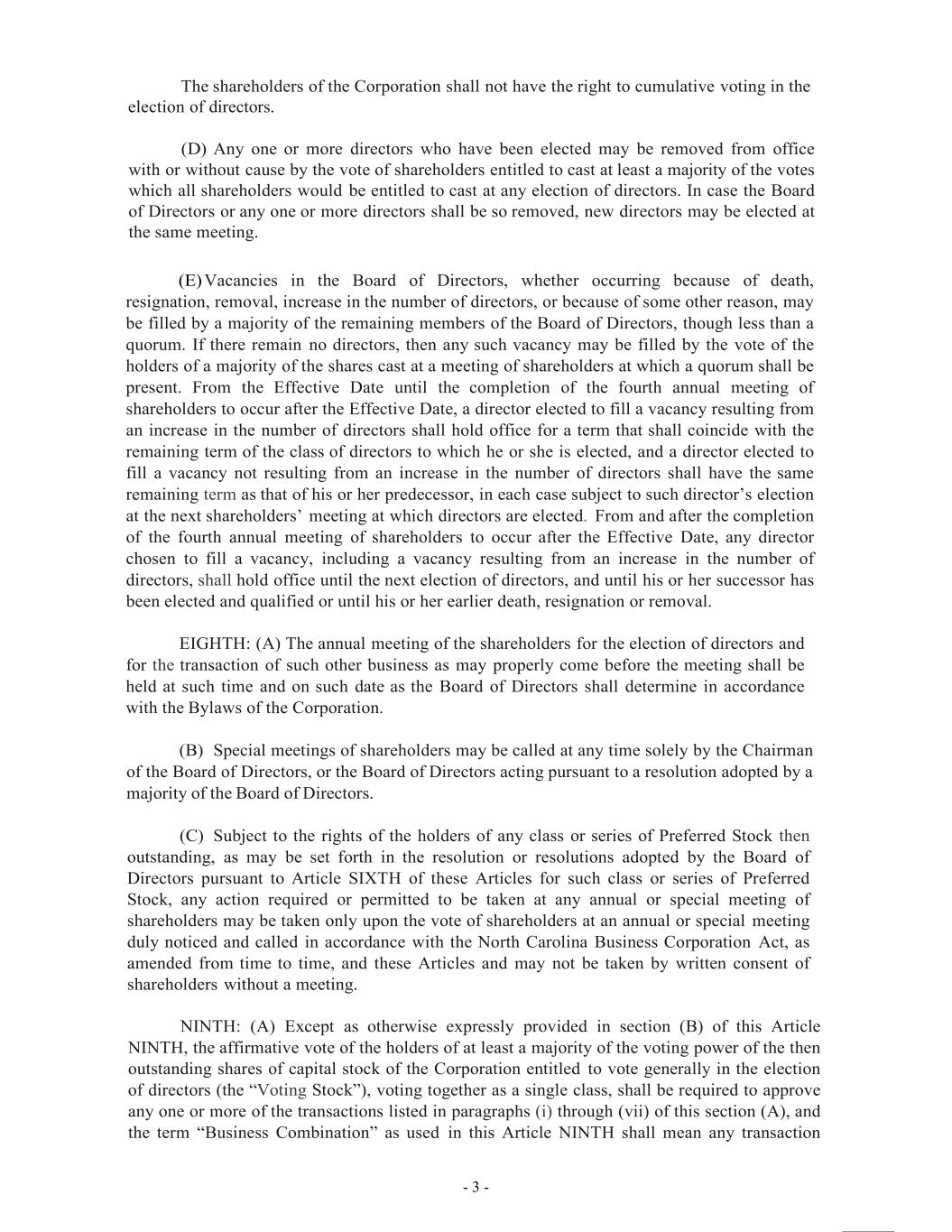
- 3 - The shareholders of the Corporation shall not have the right to cumulative voting in the election of directors. (D) Any one or more directors who have been elected may be removed from office with or without cause by the vote of shareholders entitled to cast at least a majority of the votes which all shareholders would be entitled to cast at any election of directors. In case the Board of Directors or any one or more directors shall be so removed, new directors may be elected at the same meeting. (E) Vacancies in the Board of Directors, whether occurring because of death, resignation, removal, increase in the number of directors, or because of some other reason, may be filled by a majority of the remaining members of the Board of Directors, though less than a quorum. If there remain no directors, then any such vacancy may be filled by the vote of the holders of a majority of the shares cast at a meeting of shareholders at which a quorum shall be present. From the Effective Date until the completion of the fourth annual meeting of shareholders to occur after the Effective Date, a director elected to fill a vacancy resulting from an increase in the number of directors shall hold office for a term that shall coincide with the remaining term of the class of directors to which he or she is elected, and a director elected to fill a vacancy not resulting from an increase in the number of directors shall have the same remaining term as that of his or her predecessor, in each case subject to such director’s election at the next shareholders’ meeting at which directors are elected. From and after the completion of the fourth annual meeting of shareholders to occur after the Effective Date, any director chosen to fill a vacancy, including a vacancy resulting from an increase in the number of directors, shall hold office until the next election of directors, and until his or her successor has been elected and qualified or until his or her earlier death, resignation or removal. EIGHTH: (A) The annual meeting of the shareholders for the election of directors and for the transaction of such other business as may properly come before the meeting shall be held at such time and on such date as the Board of Directors shall determine in accordance with the Bylaws of the Corporation. (B) Special meetings of shareholders may be called at any time solely by the Chairman of the Board of Directors, or the Board of Directors acting pursuant to a resolution adopted by a majority of the Board of Directors. (C) Subject to the rights of the holders of any class or series of Preferred Stock then outstanding, as may be set forth in the resolution or resolutions adopted by the Board of Directors pursuant to Article SIXTH of these Articles for such class or series of Preferred Stock, any action required or permitted to be taken at any annual or special meeting of shareholders may be taken only upon the vote of shareholders at an annual or special meeting duly noticed and called in accordance with the North Carolina Business Corporation Act, as amended from time to time, and these Articles and may not be taken by written consent of shareholders without a meeting. NINTH: (A) Except as otherwise expressly provided in section (B) of this Article NINTH, the affirmative vote of the holders of at least a majority of the voting power of the then outstanding shares of capital stock of the Corporation entitled to vote generally in the election of directors (the “Voting Stock”), voting together as a single class, shall be required to approve any one or more of the transactions listed in paragraphs (i) through (vii) of this section (A), and the term “Business Combination” as used in this Article NINTH shall mean any transaction
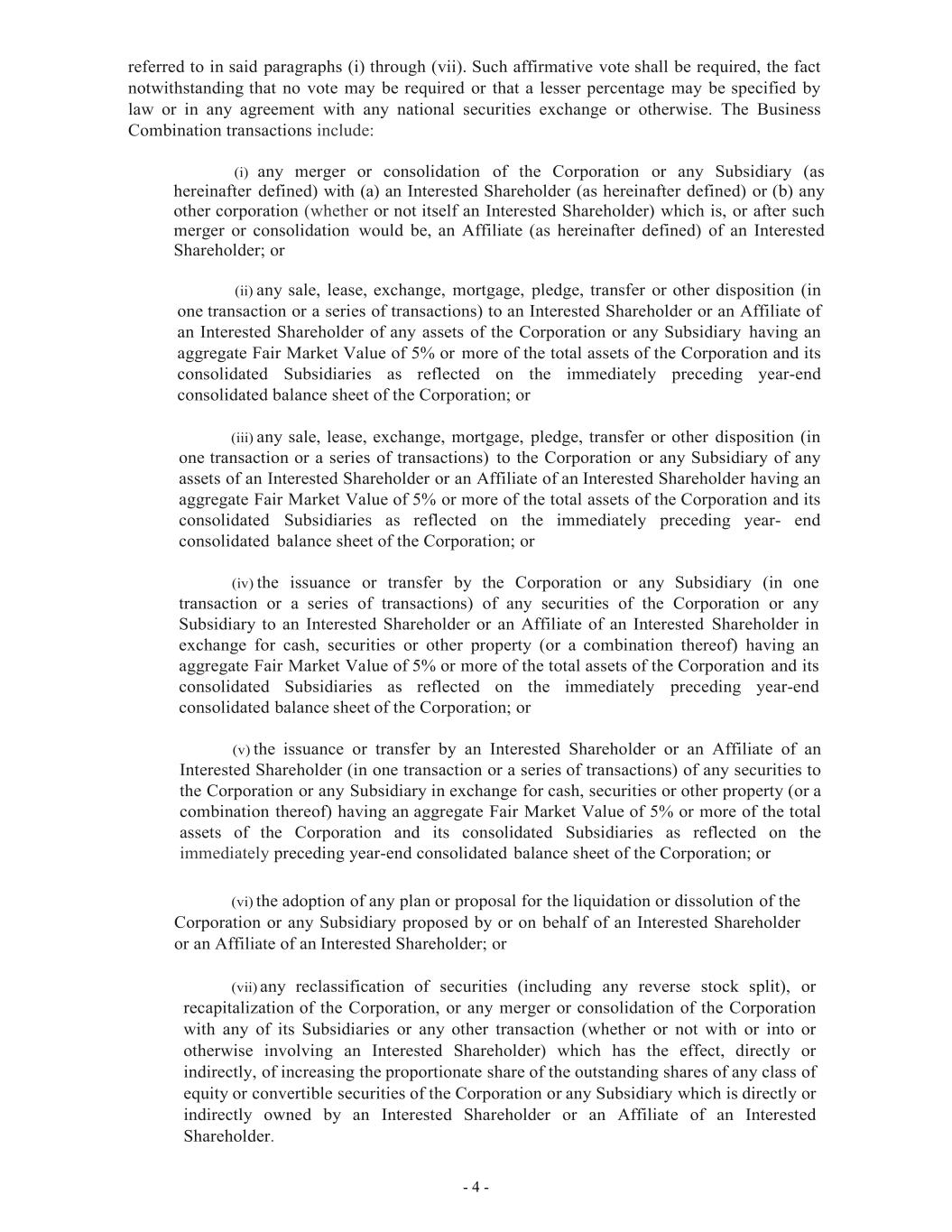
- 4 - referred to in said paragraphs (i) through (vii). Such affirmative vote shall be required, the fact notwithstanding that no vote may be required or that a lesser percentage may be specified by law or in any agreement with any national securities exchange or otherwise. The Business Combination transactions include: (i) any merger or consolidation of the Corporation or any Subsidiary (as hereinafter defined) with (a) an Interested Shareholder (as hereinafter defined) or (b) any other corporation (whether or not itself an Interested Shareholder) which is, or after such merger or consolidation would be, an Affiliate (as hereinafter defined) of an Interested Shareholder; or (ii) any sale, lease, exchange, mortgage, pledge, transfer or other disposition (in one transaction or a series of transactions) to an Interested Shareholder or an Affiliate of an Interested Shareholder of any assets of the Corporation or any Subsidiary having an aggregate Fair Market Value of 5% or more of the total assets of the Corporation and its consolidated Subsidiaries as reflected on the immediately preceding year-end consolidated balance sheet of the Corporation; or (iii) any sale, lease, exchange, mortgage, pledge, transfer or other disposition (in one transaction or a series of transactions) to the Corporation or any Subsidiary of any assets of an Interested Shareholder or an Affiliate of an Interested Shareholder having an aggregate Fair Market Value of 5% or more of the total assets of the Corporation and its consolidated Subsidiaries as reflected on the immediately preceding year- end consolidated balance sheet of the Corporation; or (iv) the issuance or transfer by the Corporation or any Subsidiary (in one transaction or a series of transactions) of any securities of the Corporation or any Subsidiary to an Interested Shareholder or an Affiliate of an Interested Shareholder in exchange for cash, securities or other property (or a combination thereof) having an aggregate Fair Market Value of 5% or more of the total assets of the Corporation and its consolidated Subsidiaries as reflected on the immediately preceding year-end consolidated balance sheet of the Corporation; or (v) the issuance or transfer by an Interested Shareholder or an Affiliate of an Interested Shareholder (in one transaction or a series of transactions) of any securities to the Corporation or any Subsidiary in exchange for cash, securities or other property (or a combination thereof) having an aggregate Fair Market Value of 5% or more of the total assets of the Corporation and its consolidated Subsidiaries as reflected on the immediately preceding year-end consolidated balance sheet of the Corporation; or (vi) the adoption of any plan or proposal for the liquidation or dissolution of the Corporation or any Subsidiary proposed by or on behalf of an Interested Shareholder or an Affiliate of an Interested Shareholder; or (vii) any reclassification of securities (including any reverse stock split), or recapitalization of the Corporation, or any merger or consolidation of the Corporation with any of its Subsidiaries or any other transaction (whether or not with or into or otherwise involving an Interested Shareholder) which has the effect, directly or indirectly, of increasing the proportionate share of the outstanding shares of any class of equity or convertible securities of the Corporation or any Subsidiary which is directly or indirectly owned by an Interested Shareholder or an Affiliate of an Interested Shareholder.
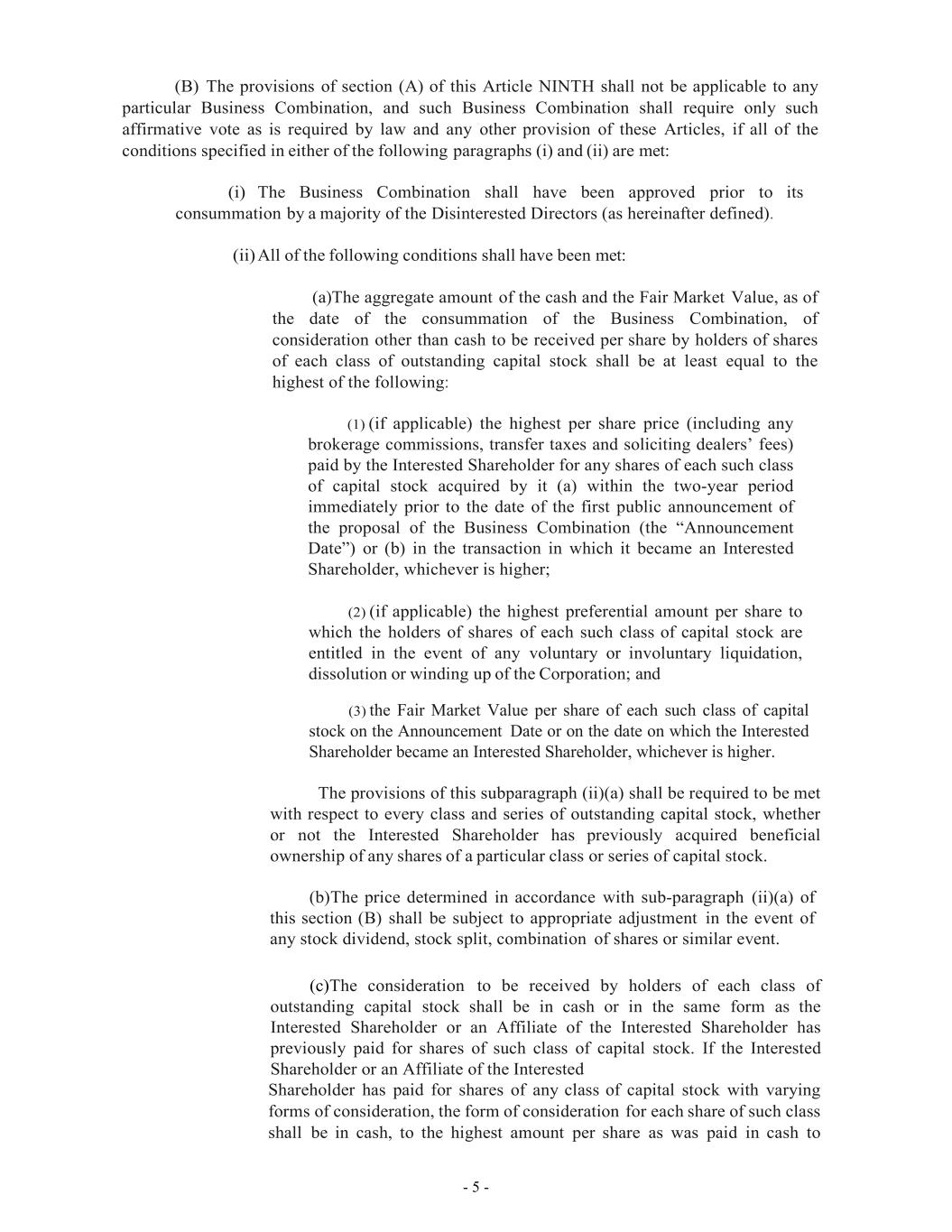
- 5 - (B) The provisions of section (A) of this Article NINTH shall not be applicable to any particular Business Combination, and such Business Combination shall require only such affirmative vote as is required by law and any other provision of these Articles, if all of the conditions specified in either of the following paragraphs (i) and (ii) are met: (i) The Business Combination shall have been approved prior to its consummation by a majority of the Disinterested Directors (as hereinafter defined). (ii) All of the following conditions shall have been met: (a)The aggregate amount of the cash and the Fair Market Value, as of the date of the consummation of the Business Combination, of consideration other than cash to be received per share by holders of shares of each class of outstanding capital stock shall be at least equal to the highest of the following: (1) (if applicable) the highest per share price (including any brokerage commissions, transfer taxes and soliciting dealers’ fees) paid by the Interested Shareholder for any shares of each such class of capital stock acquired by it (a) within the two-year period immediately prior to the date of the first public announcement of the proposal of the Business Combination (the “Announcement Date”) or (b) in the transaction in which it became an Interested Shareholder, whichever is higher; (2) (if applicable) the highest preferential amount per share to which the holders of shares of each such class of capital stock are entitled in the event of any voluntary or involuntary liquidation, dissolution or winding up of the Corporation; and (3) the Fair Market Value per share of each such class of capital stock on the Announcement Date or on the date on which the Interested Shareholder became an Interested Shareholder, whichever is higher. The provisions of this subparagraph (ii)(a) shall be required to be met with respect to every class and series of outstanding capital stock, whether or not the Interested Shareholder has previously acquired beneficial ownership of any shares of a particular class or series of capital stock. (b) The price determined in accordance with sub-paragraph (ii)(a) of this section (B) shall be subject to appropriate adjustment in the event of any stock dividend, stock split, combination of shares or similar event. (c) The consideration to be received by holders of each class of outstanding capital stock shall be in cash or in the same form as the Interested Shareholder or an Affiliate of the Interested Shareholder has previously paid for shares of such class of capital stock. If the Interested Shareholder or an Affiliate of the Interested Shareholder has paid for shares of any class of capital stock with varying forms of consideration, the form of consideration for each share of such class shall be in cash, to the highest amount per share as was paid in cash to
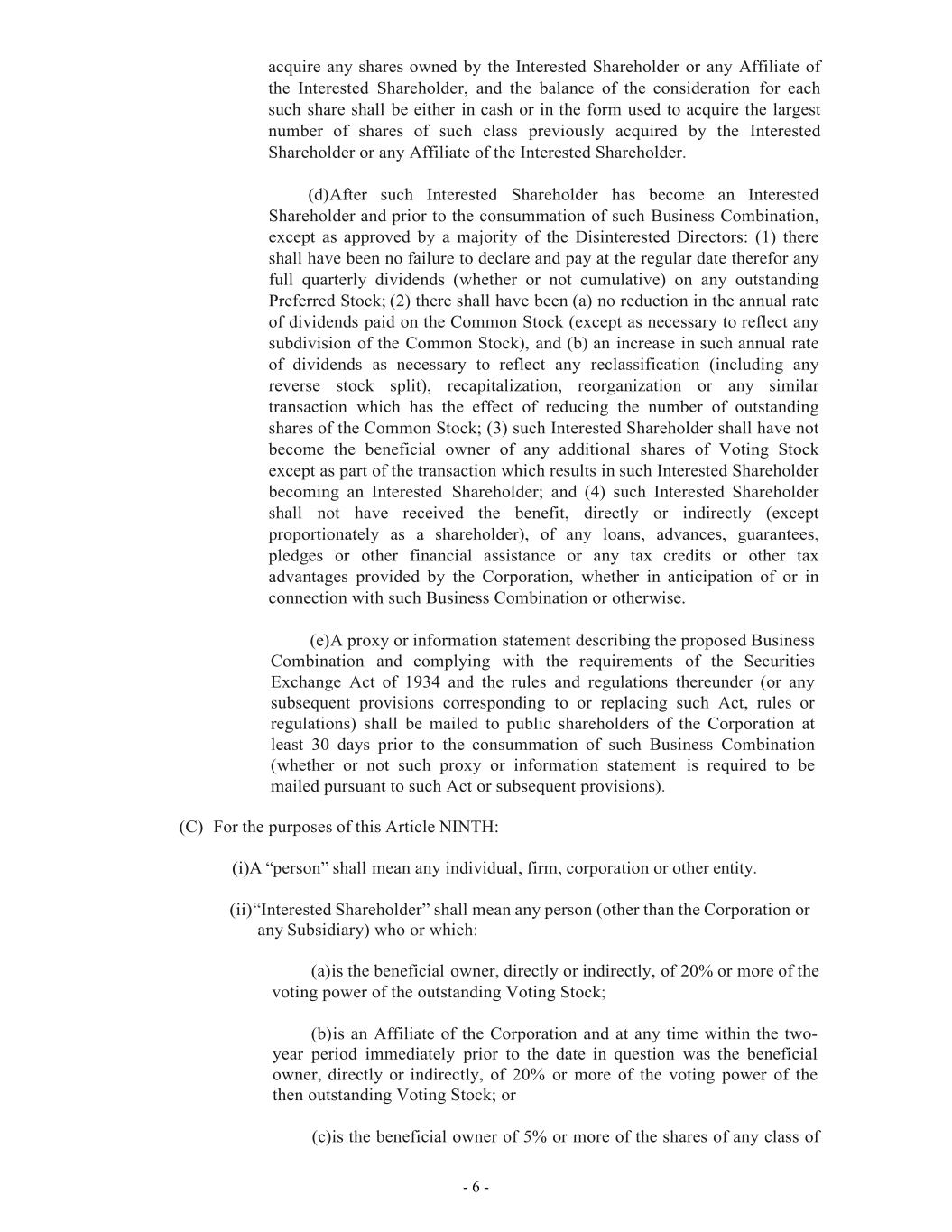
- 6 - acquire any shares owned by the Interested Shareholder or any Affiliate of the Interested Shareholder, and the balance of the consideration for each such share shall be either in cash or in the form used to acquire the largest number of shares of such class previously acquired by the Interested Shareholder or any Affiliate of the Interested Shareholder. (d) After such Interested Shareholder has become an Interested Shareholder and prior to the consummation of such Business Combination, except as approved by a majority of the Disinterested Directors: (1) there shall have been no failure to declare and pay at the regular date therefor any full quarterly dividends (whether or not cumulative) on any outstanding Preferred Stock; (2) there shall have been (a) no reduction in the annual rate of dividends paid on the Common Stock (except as necessary to reflect any subdivision of the Common Stock), and (b) an increase in such annual rate of dividends as necessary to reflect any reclassification (including any reverse stock split), recapitalization, reorganization or any similar transaction which has the effect of reducing the number of outstanding shares of the Common Stock; (3) such Interested Shareholder shall have not become the beneficial owner of any additional shares of Voting Stock except as part of the transaction which results in such Interested Shareholder becoming an Interested Shareholder; and (4) such Interested Shareholder shall not have received the benefit, directly or indirectly (except proportionately as a shareholder), of any loans, advances, guarantees, pledges or other financial assistance or any tax credits or other tax advantages provided by the Corporation, whether in anticipation of or in connection with such Business Combination or otherwise. (e) A proxy or information statement describing the proposed Business Combination and complying with the requirements of the Securities Exchange Act of 1934 and the rules and regulations thereunder (or any subsequent provisions corresponding to or replacing such Act, rules or regulations) shall be mailed to public shareholders of the Corporation at least 30 days prior to the consummation of such Business Combination (whether or not such proxy or information statement is required to be mailed pursuant to such Act or subsequent provisions). (C) For the purposes of this Article NINTH: (i)A “person” shall mean any individual, firm, corporation or other entity. (ii) “Interested Shareholder” shall mean any person (other than the Corporation or any Subsidiary) who or which: (a) is the beneficial owner, directly or indirectly, of 20% or more of the voting power of the outstanding Voting Stock; (b) is an Affiliate of the Corporation and at any time within the two- year period immediately prior to the date in question was the beneficial owner, directly or indirectly, of 20% or more of the voting power of the then outstanding Voting Stock; or (c) is the beneficial owner of 5% or more of the shares of any class of
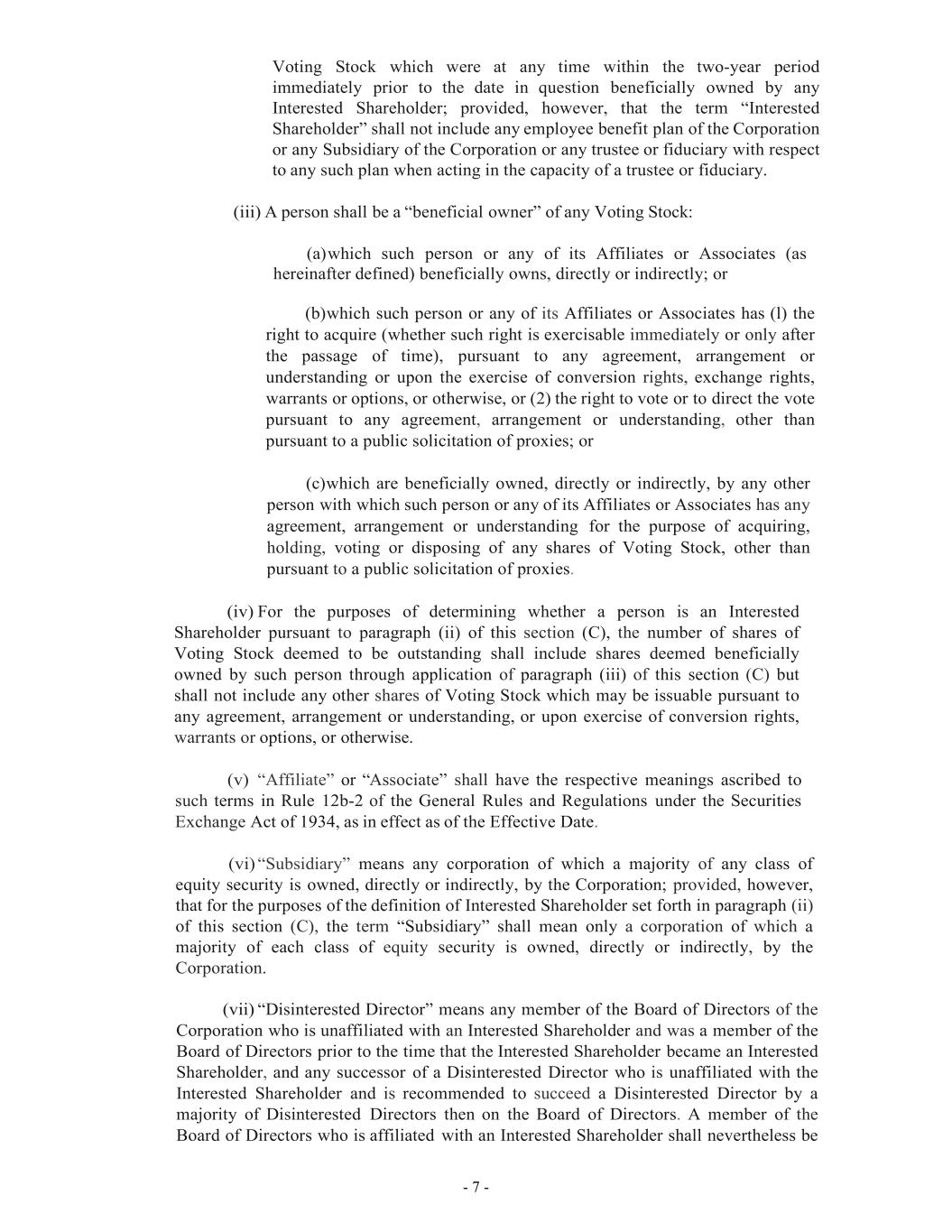
- 7 - Voting Stock which were at any time within the two-year period immediately prior to the date in question beneficially owned by any Interested Shareholder; provided, however, that the term “Interested Shareholder” shall not include any employee benefit plan of the Corporation or any Subsidiary of the Corporation or any trustee or fiduciary with respect to any such plan when acting in the capacity of a trustee or fiduciary. (iii) A person shall be a “beneficial owner” of any Voting Stock: (a) which such person or any of its Affiliates or Associates (as hereinafter defined) beneficially owns, directly or indirectly; or (b) which such person or any of its Affiliates or Associates has (l) the right to acquire (whether such right is exercisable immediately or only after the passage of time), pursuant to any agreement, arrangement or understanding or upon the exercise of conversion rights, exchange rights, warrants or options, or otherwise, or (2) the right to vote or to direct the vote pursuant to any agreement, arrangement or understanding, other than pursuant to a public solicitation of proxies; or (c) which are beneficially owned, directly or indirectly, by any other person with which such person or any of its Affiliates or Associates has any agreement, arrangement or understanding for the purpose of acquiring, holding, voting or disposing of any shares of Voting Stock, other than pursuant to a public solicitation of proxies. (iv) For the purposes of determining whether a person is an Interested Shareholder pursuant to paragraph (ii) of this section (C), the number of shares of Voting Stock deemed to be outstanding shall include shares deemed beneficially owned by such person through application of paragraph (iii) of this section (C) but shall not include any other shares of Voting Stock which may be issuable pursuant to any agreement, arrangement or understanding, or upon exercise of conversion rights, warrants or options, or otherwise. (v) “Affiliate” or “Associate” shall have the respective meanings ascribed to such terms in Rule 12b-2 of the General Rules and Regulations under the Securities Exchange Act of 1934, as in effect as of the Effective Date. (vi) “Subsidiary” means any corporation of which a majority of any class of equity security is owned, directly or indirectly, by the Corporation; provided, however, that for the purposes of the definition of Interested Shareholder set forth in paragraph (ii) of this section (C), the term “Subsidiary” shall mean only a corporation of which a majority of each class of equity security is owned, directly or indirectly, by the Corporation. (vii) “Disinterested Director” means any member of the Board of Directors of the Corporation who is unaffiliated with an Interested Shareholder and was a member of the Board of Directors prior to the time that the Interested Shareholder became an Interested Shareholder, and any successor of a Disinterested Director who is unaffiliated with the Interested Shareholder and is recommended to succeed a Disinterested Director by a majority of Disinterested Directors then on the Board of Directors. A member of the Board of Directors who is affiliated with an Interested Shareholder shall nevertheless be
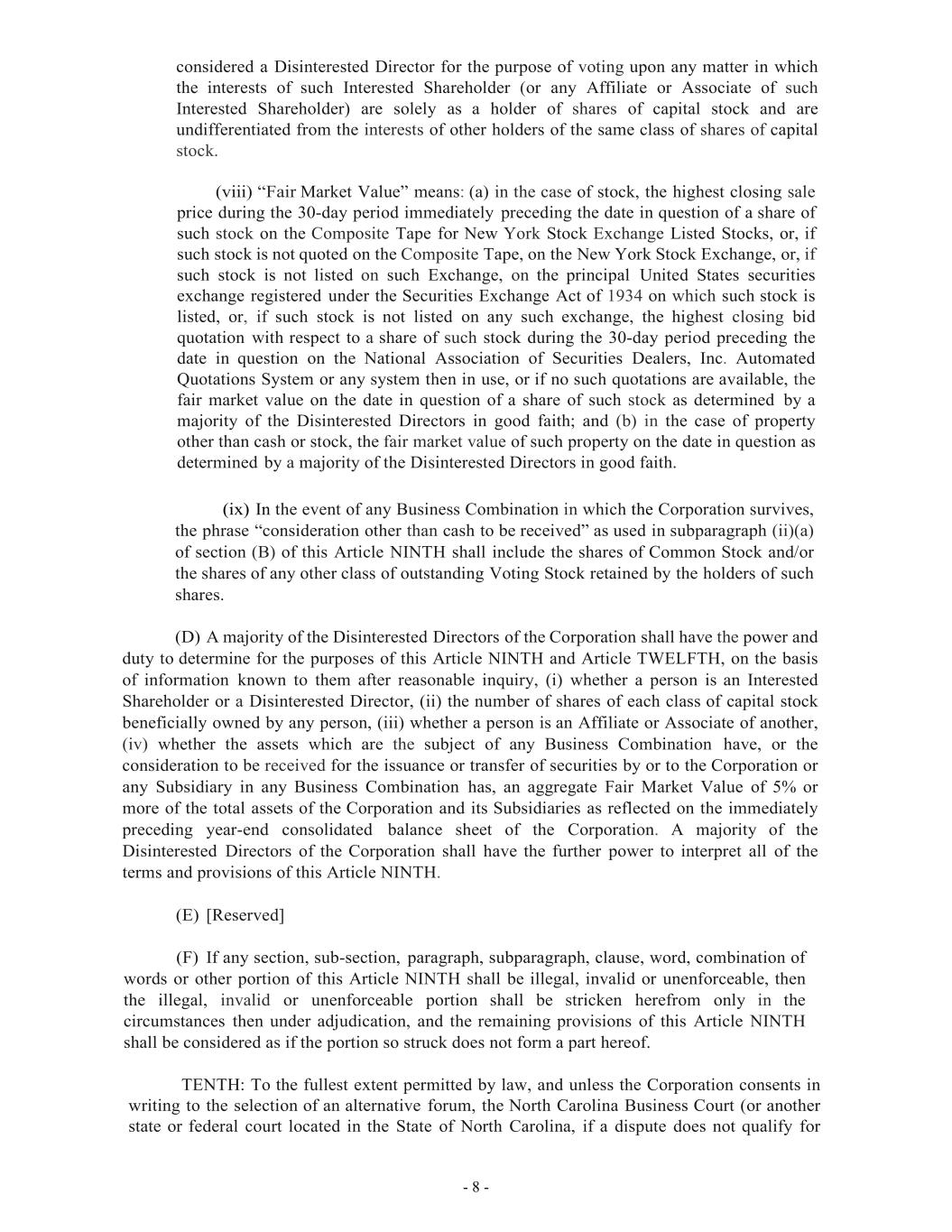
- 8 - considered a Disinterested Director for the purpose of voting upon any matter in which the interests of such Interested Shareholder (or any Affiliate or Associate of such Interested Shareholder) are solely as a holder of shares of capital stock and are undifferentiated from the interests of other holders of the same class of shares of capital stock. (viii) “Fair Market Value” means: (a) in the case of stock, the highest closing sale price during the 30-day period immediately preceding the date in question of a share of such stock on the Composite Tape for New York Stock Exchange Listed Stocks, or, if such stock is not quoted on the Composite Tape, on the New York Stock Exchange, or, if such stock is not listed on such Exchange, on the principal United States securities exchange registered under the Securities Exchange Act of 1934 on which such stock is listed, or, if such stock is not listed on any such exchange, the highest closing bid quotation with respect to a share of such stock during the 30-day period preceding the date in question on the National Association of Securities Dealers, Inc. Automated Quotations System or any system then in use, or if no such quotations are available, the fair market value on the date in question of a share of such stock as determined by a majority of the Disinterested Directors in good faith; and (b) in the case of property other than cash or stock, the fair market value of such property on the date in question as determined by a majority of the Disinterested Directors in good faith. (ix) In the event of any Business Combination in which the Corporation survives, the phrase “consideration other than cash to be received” as used in subparagraph (ii)(a) of section (B) of this Article NINTH shall include the shares of Common Stock and/or the shares of any other class of outstanding Voting Stock retained by the holders of such shares. (D) A majority of the Disinterested Directors of the Corporation shall have the power and duty to determine for the purposes of this Article NINTH and Article TWELFTH, on the basis of information known to them after reasonable inquiry, (i) whether a person is an Interested Shareholder or a Disinterested Director, (ii) the number of shares of each class of capital stock beneficially owned by any person, (iii) whether a person is an Affiliate or Associate of another, (iv) whether the assets which are the subject of any Business Combination have, or the consideration to be received for the issuance or transfer of securities by or to the Corporation or any Subsidiary in any Business Combination has, an aggregate Fair Market Value of 5% or more of the total assets of the Corporation and its Subsidiaries as reflected on the immediately preceding year-end consolidated balance sheet of the Corporation. A majority of the Disinterested Directors of the Corporation shall have the further power to interpret all of the terms and provisions of this Article NINTH. (E) [Reserved] (F) If any section, sub-section, paragraph, subparagraph, clause, word, combination of words or other portion of this Article NINTH shall be illegal, invalid or unenforceable, then the illegal, invalid or unenforceable portion shall be stricken herefrom only in the circumstances then under adjudication, and the remaining provisions of this Article NINTH shall be considered as if the portion so struck does not form a part hereof. TENTH: To the fullest extent permitted by law, and unless the Corporation consents in writing to the selection of an alternative forum, the North Carolina Business Court (or another state or federal court located in the State of North Carolina, if a dispute does not qualify for
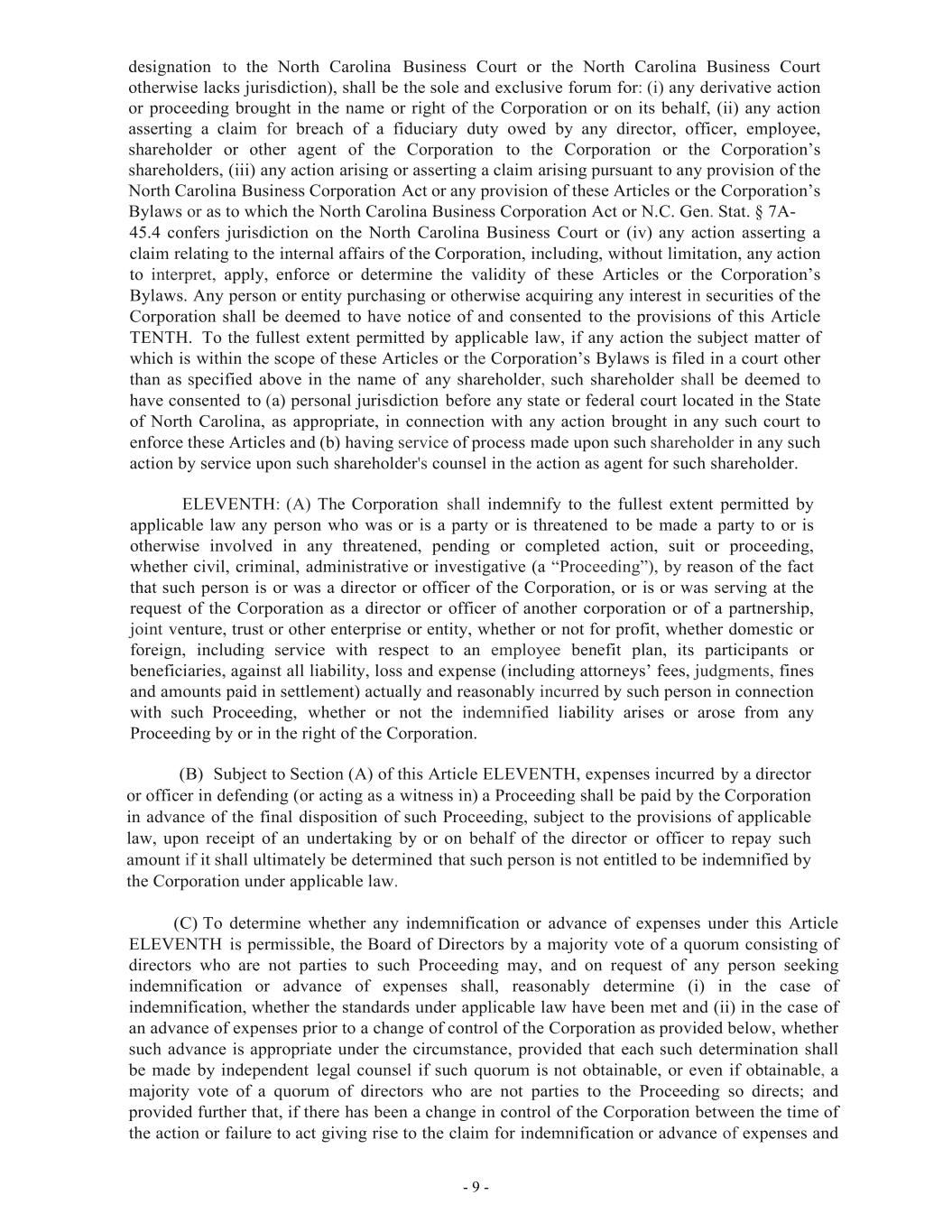
- 9 - designation to the North Carolina Business Court or the North Carolina Business Court otherwise lacks jurisdiction), shall be the sole and exclusive forum for: (i) any derivative action or proceeding brought in the name or right of the Corporation or on its behalf, (ii) any action asserting a claim for breach of a fiduciary duty owed by any director, officer, employee, shareholder or other agent of the Corporation to the Corporation or the Corporation’s shareholders, (iii) any action arising or asserting a claim arising pursuant to any provision of the North Carolina Business Corporation Act or any provision of these Articles or the Corporation’s Bylaws or as to which the North Carolina Business Corporation Act or N.C. Gen. Stat. § 7A- 45.4 confers jurisdiction on the North Carolina Business Court or (iv) any action asserting a claim relating to the internal affairs of the Corporation, including, without limitation, any action to interpret, apply, enforce or determine the validity of these Articles or the Corporation’s Bylaws. Any person or entity purchasing or otherwise acquiring any interest in securities of the Corporation shall be deemed to have notice of and consented to the provisions of this Article TENTH. To the fullest extent permitted by applicable law, if any action the subject matter of which is within the scope of these Articles or the Corporation’s Bylaws is filed in a court other than as specified above in the name of any shareholder, such shareholder shall be deemed to have consented to (a) personal jurisdiction before any state or federal court located in the State of North Carolina, as appropriate, in connection with any action brought in any such court to enforce these Articles and (b) having service of process made upon such shareholder in any such action by service upon such shareholder's counsel in the action as agent for such shareholder. ELEVENTH: (A) The Corporation shall indemnify to the fullest extent permitted by applicable law any person who was or is a party or is threatened to be made a party to or is otherwise involved in any threatened, pending or completed action, suit or proceeding, whether civil, criminal, administrative or investigative (a “Proceeding”), by reason of the fact that such person is or was a director or officer of the Corporation, or is or was serving at the request of the Corporation as a director or officer of another corporation or of a partnership, joint venture, trust or other enterprise or entity, whether or not for profit, whether domestic or foreign, including service with respect to an employee benefit plan, its participants or beneficiaries, against all liability, loss and expense (including attorneys’ fees, judgments, fines and amounts paid in settlement) actually and reasonably incurred by such person in connection with such Proceeding, whether or not the indemnified liability arises or arose from any Proceeding by or in the right of the Corporation. (B) Subject to Section (A) of this Article ELEVENTH, expenses incurred by a director or officer in defending (or acting as a witness in) a Proceeding shall be paid by the Corporation in advance of the final disposition of such Proceeding, subject to the provisions of applicable law, upon receipt of an undertaking by or on behalf of the director or officer to repay such amount if it shall ultimately be determined that such person is not entitled to be indemnified by the Corporation under applicable law. (C) To determine whether any indemnification or advance of expenses under this Article ELEVENTH is permissible, the Board of Directors by a majority vote of a quorum consisting of directors who are not parties to such Proceeding may, and on request of any person seeking indemnification or advance of expenses shall, reasonably determine (i) in the case of indemnification, whether the standards under applicable law have been met and (ii) in the case of an advance of expenses prior to a change of control of the Corporation as provided below, whether such advance is appropriate under the circumstance, provided that each such determination shall be made by independent legal counsel if such quorum is not obtainable, or even if obtainable, a majority vote of a quorum of directors who are not parties to the Proceeding so directs; and provided further that, if there has been a change in control of the Corporation between the time of the action or failure to act giving rise to the claim for indemnification or advance of expenses and
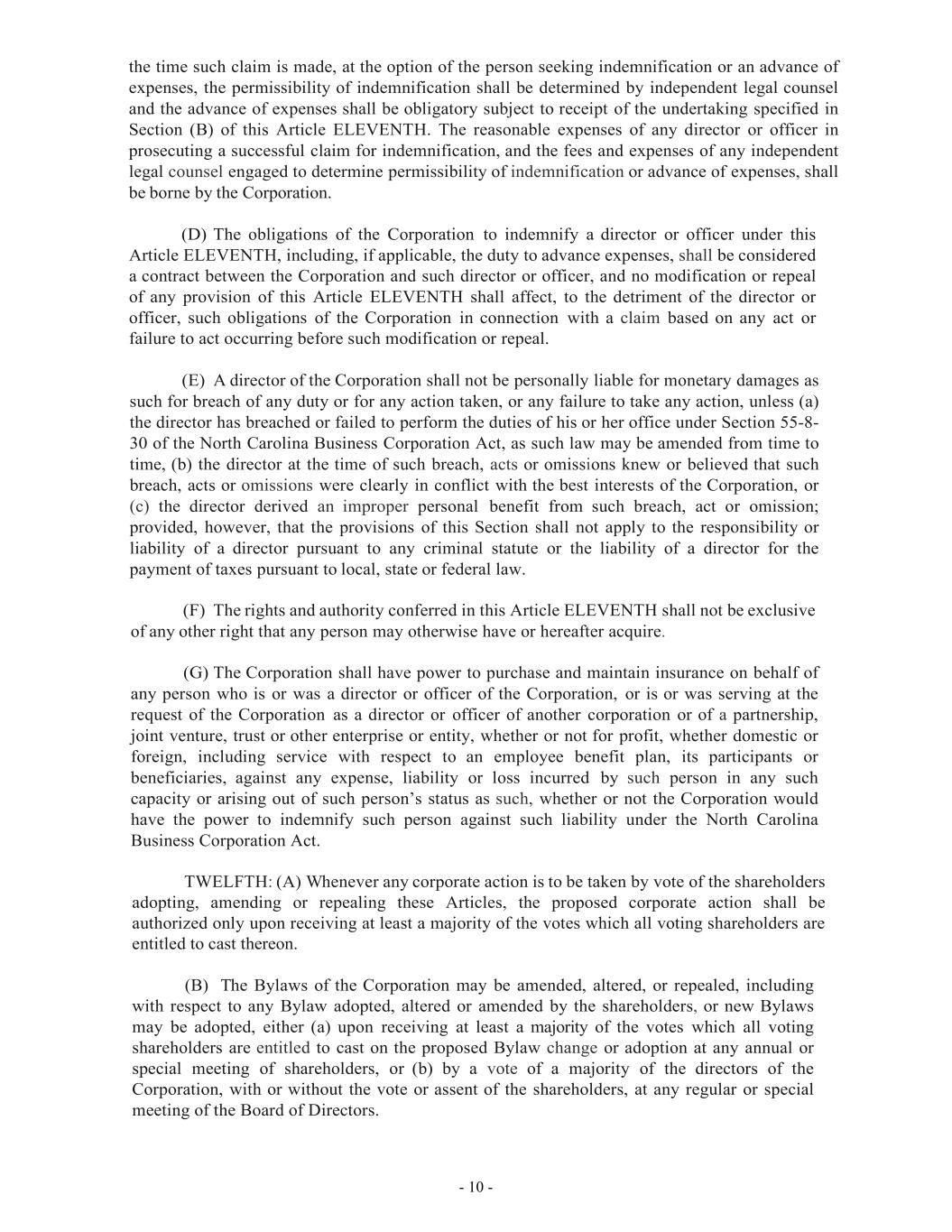
- 10 - the time such claim is made, at the option of the person seeking indemnification or an advance of expenses, the permissibility of indemnification shall be determined by independent legal counsel and the advance of expenses shall be obligatory subject to receipt of the undertaking specified in Section (B) of this Article ELEVENTH. The reasonable expenses of any director or officer in prosecuting a successful claim for indemnification, and the fees and expenses of any independent legal counsel engaged to determine permissibility of indemnification or advance of expenses, shall be borne by the Corporation. (D) The obligations of the Corporation to indemnify a director or officer under this Article ELEVENTH, including, if applicable, the duty to advance expenses, shall be considered a contract between the Corporation and such director or officer, and no modification or repeal of any provision of this Article ELEVENTH shall affect, to the detriment of the director or officer, such obligations of the Corporation in connection with a claim based on any act or failure to act occurring before such modification or repeal. (E) A director of the Corporation shall not be personally liable for monetary damages as such for breach of any duty or for any action taken, or any failure to take any action, unless (a) the director has breached or failed to perform the duties of his or her office under Section 55-8- 30 of the North Carolina Business Corporation Act, as such law may be amended from time to time, (b) the director at the time of such breach, acts or omissions knew or believed that such breach, acts or omissions were clearly in conflict with the best interests of the Corporation, or (c) the director derived an improper personal benefit from such breach, act or omission; provided, however, that the provisions of this Section shall not apply to the responsibility or liability of a director pursuant to any criminal statute or the liability of a director for the payment of taxes pursuant to local, state or federal law. (F) The rights and authority conferred in this Article ELEVENTH shall not be exclusive of any other right that any person may otherwise have or hereafter acquire. (G) The Corporation shall have power to purchase and maintain insurance on behalf of any person who is or was a director or officer of the Corporation, or is or was serving at the request of the Corporation as a director or officer of another corporation or of a partnership, joint venture, trust or other enterprise or entity, whether or not for profit, whether domestic or foreign, including service with respect to an employee benefit plan, its participants or beneficiaries, against any expense, liability or loss incurred by such person in any such capacity or arising out of such person’s status as such, whether or not the Corporation would have the power to indemnify such person against such liability under the North Carolina Business Corporation Act. TWELFTH: (A) Whenever any corporate action is to be taken by vote of the shareholders adopting, amending or repealing these Articles, the proposed corporate action shall be authorized only upon receiving at least a majority of the votes which all voting shareholders are entitled to cast thereon. (B) The Bylaws of the Corporation may be amended, altered, or repealed, including with respect to any Bylaw adopted, altered or amended by the shareholders, or new Bylaws may be adopted, either (a) upon receiving at least a majority of the votes which all voting shareholders are entitled to cast on the proposed Bylaw change or adoption at any annual or special meeting of shareholders, or (b) by a vote of a majority of the directors of the Corporation, with or without the vote or assent of the shareholders, at any regular or special meeting of the Board of Directors.
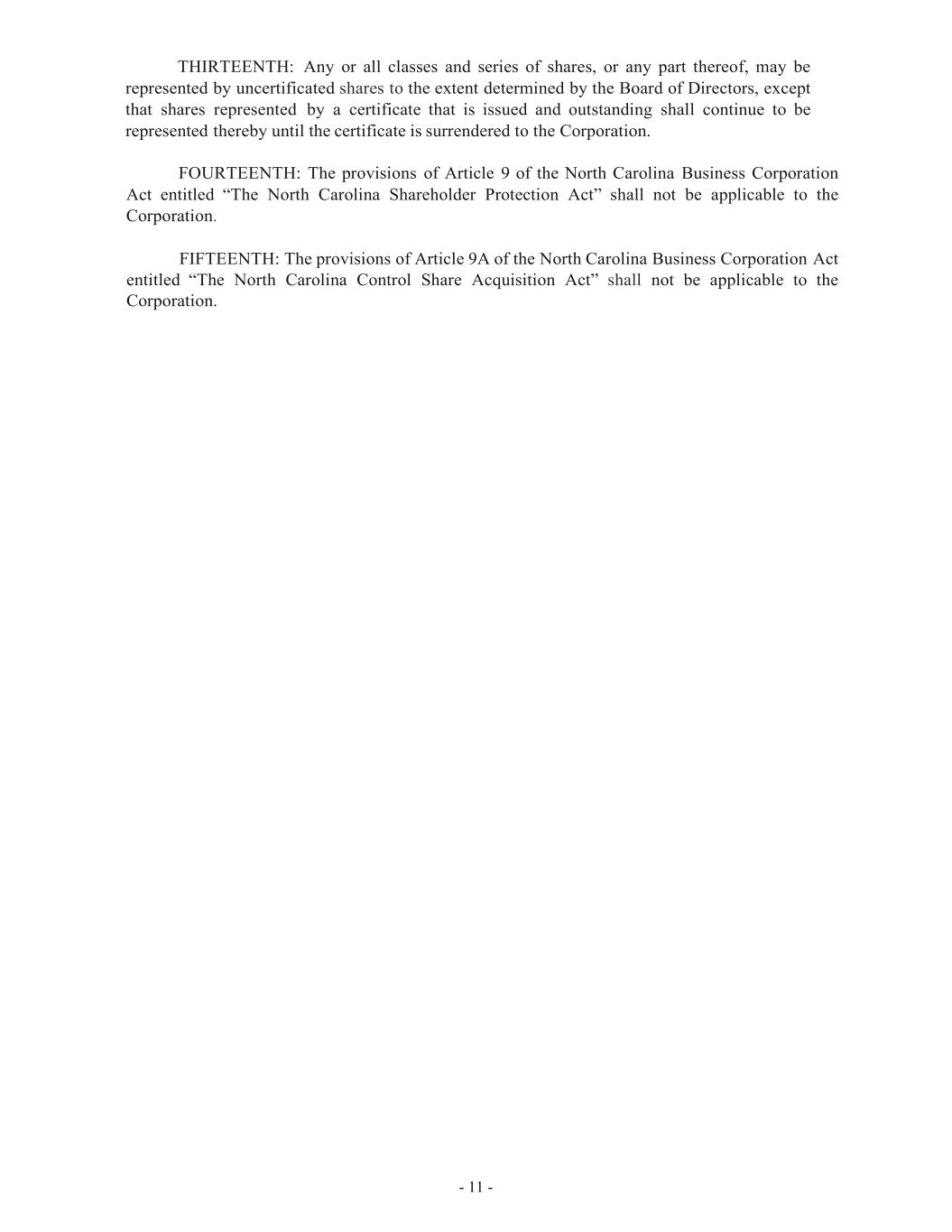
- 11 - THIRTEENTH: Any or all classes and series of shares, or any part thereof, may be represented by uncertificated shares to the extent determined by the Board of Directors, except that shares represented by a certificate that is issued and outstanding shall continue to be represented thereby until the certificate is surrendered to the Corporation. FOURTEENTH: The provisions of Article 9 of the North Carolina Business Corporation Act entitled “The North Carolina Shareholder Protection Act” shall not be applicable to the Corporation. FIFTEENTH: The provisions of Article 9A of the North Carolina Business Corporation Act entitled “The North Carolina Control Share Acquisition Act” shall not be applicable to the Corporation.